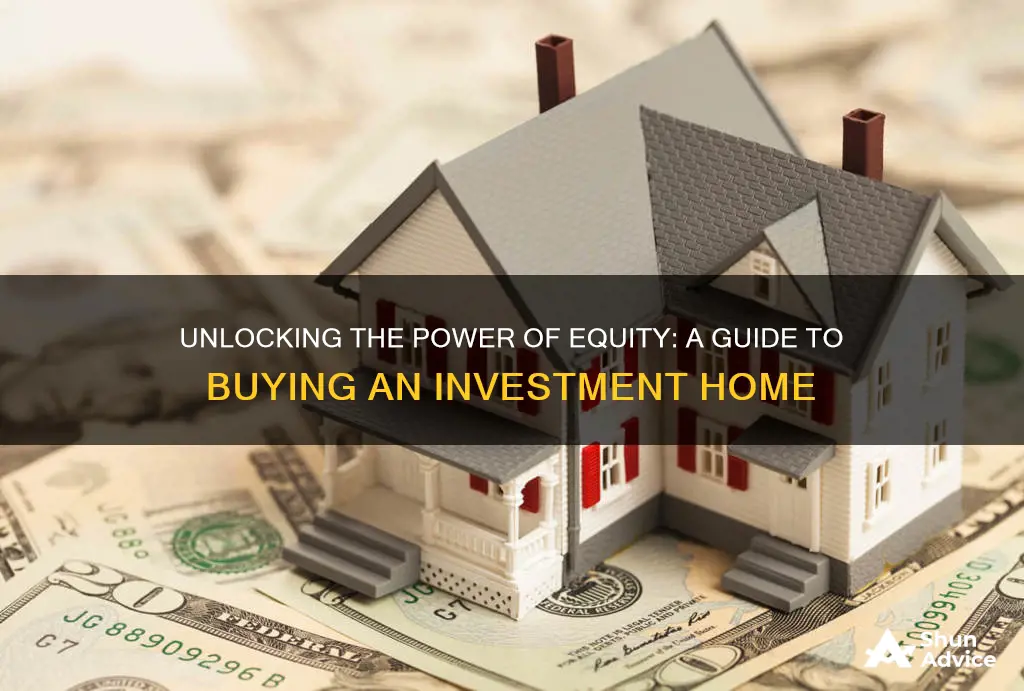
Using a home equity loan to buy an investment property can be a great way to build passive income and diversify your investment portfolio. However, it is important to carefully consider the risks involved.
Home equity is the difference between the value of your property and the outstanding debt on your home loan. You can calculate your usable equity by subtracting your current outstanding debt from 80% of the value of your home. This usable equity can then be put towards a deposit for a home loan, as well as other buying costs.
There are several advantages to using home equity to buy an investment property. It can help with the down payment, potentially lowering your monthly payments and interest rates. It can also solve financing challenges, as it is often more convenient and affordable than other options. Additionally, interest rates for home equity loans tend to be lower than other forms of financing.
However, there are also some potential drawbacks. By taking out a home equity loan, you are trading an asset for debt, and you may be more vulnerable to shifts in the housing market. If you default on the loan, you could lose both your primary and secondary properties. Additionally, your home equity loan interest payments may not be tax-deductible.
Overall, while using a home equity loan to buy an investment property can be a beneficial option, it is important to carefully weigh the pros and cons before making any decisions.
| Characteristics | Values |
|---|---|
| Home equity | The difference between the value of your property and the outstanding debt on your home loan |
| How to calculate usable equity | Calculate 80% of the value of your home and subtract your current outstanding debt |
| Borrowing power | In most instances, you need a 20% deposit for a home loan |
| Pros | Lock in a better interest rate and avoid paying LMI |
| Cons | The property you’re taking equity from will become additional security for your new loan |
| Requirements | Credit score of 620 or above, decent credit, proof of income sufficient to pay back the loan |
| Risks | Default on your loan and lose your home, your home’s value could decrease |
| Alternatives | Cash savings, hard money loan, peer-to-peer loan, personal loan |
What You'll Learn

Home equity loans can be used for a lump-sum payout
Home equity loans are a popular choice for homeowners who want to take on some kind of home improvement project. They are also a good option for those who want to buy an investment property. The cash is yours to use as you wish after the loan closes. However, it is important to keep in mind the risks involved in taking out a home equity loan.
Home equity loan proceeds can be used on anything you choose, including investing in real estate. Home equity loans allow you to borrow against your home's equity for a lump-sum payout that you pay back over time with a fixed interest rate and fixed monthly payments.
A home equity loan generally allows you to borrow around 80% to 85% of your home's value, minus what you owe on your mortgage. Some lenders allow you to borrow significantly more — even as much as 100% in some instances.
Say your home is worth $350,000, your mortgage balance is $200,000 and your lender will allow you to borrow up to 85% of your home's value. Multiply your home's value ($350,000) by the percentage you can borrow (85% or .85). That gives you a maximum of $297,500 in value that could be borrowed. Subtract the amount remaining on your mortgage ($200,000), and you'll get the approximate maximum sum you can borrow as a home equity loan — in this case, $97,500.
Home equity loans are commonly known as "second liens" or "second mortgages". They finance a portion of the total value of the home, with the property acting as collateral. You’ll receive the full amount at closing, and you’ll repay the home equity loan — principal and interest each month — at a fixed rate, which doesn’t affect your primary mortgage rate.
Home equity loans are a good option for those who want to access a large amount of cash upfront. However, it's important to remember that you'll be paying interest on the entire loan amount, even if you're using it incrementally. Additionally, as with any loan secured by your house, missed or late payments can put your home in jeopardy.
Lucrative Options: Exploring 5% Returns on Investments
You may want to see also

Pros and cons of using home equity to buy an investment property
Using home equity to buy an investment property can be a great way to build passive income and diversify your investment portfolio. However, there are both advantages and disadvantages to this approach. Here are some key points to consider:
Pros:
- Down payment assistance: If you don't have enough cash for a down payment on an investment property, a home equity loan can help you reach that goal. A larger down payment can also help you secure better financing terms.
- Lower interest rates: Depending on your situation, you may be able to secure a lower interest rate on a home equity loan compared to other loan options, such as hard money loans.
- Leverage your assets: Using home equity to buy an investment property allows you to leverage your assets to build wealth over the long term. The additional property can provide an extra income source and potential appreciation.
- Fixed interest rate and consistent payments: With a home equity loan, you'll typically have a fixed interest rate and consistent monthly payments without touching your primary mortgage.
Cons:
- Trading an asset for debt: Home equity is an asset, and while a home equity loan allows you to access this equity, you'll need to pay interest and fees.
- Vulnerable to market shifts: Owning multiple properties increases your exposure to fluctuations in the housing market. If you can't keep up with payments, you could lose one or both homes.
- High combined loan-to-value (CLTV) risk: Choosing a lender with a higher CLTV because you need more funds could put you at risk of being underwater on your loan if the property value decreases.
- Lump-sum payout: Home equity loans provide a lump-sum payout, which may result in paying more interest and draining more equity than necessary.
Investors: Money Masters or Risk-Takers?
You may want to see also

Calculating how much you can borrow
Firstly, you'll need to calculate your loan-to-value (LTV) ratio. This is done by taking the amount of your existing mortgage and dividing it by the appraised value of your home. For example, if you owe $120,000 on a mortgage for a home valued at $200,000, your LTV is 60%. Most lenders require an LTV of 80% or less, meaning you should have at least 20% equity in your home.
Next, you'll need to determine how much equity you can borrow. Lenders generally allow you to borrow between 80% and 85% of your home's appraised value, minus what you owe on your mortgage. Using the previous example, if your lender allows you to borrow up to 85% of your home's value, you can borrow a maximum of $170,000 ($200,000 x 0.85). Subtracting what you owe on your mortgage ($120,000) gives you a maximum home equity loan amount of $50,000.
It's important to note that these are general guidelines, and specific lenders may have different requirements and limitations. Some lenders may allow you to borrow more or less than the typical 80-85% of your home's value, so it's essential to shop around and compare offers from multiple lenders.
Additionally, to qualify for a home equity loan, you'll typically need a credit score of 620 or higher and a debt-to-income ratio of 43% or lower. Lenders may also require an appraisal of your home to confirm its fair market value and determine how much you're eligible to borrow.
The Power of Self-Investment: Unlocking Your True Potential
You may want to see also

Loan options when using home equity to buy an investment property
There are three main loan options to consider when you want to convert your home equity into cash to buy an investment property:
- A cash-out refinance allows you to replace your current home loan with a new mortgage for a higher amount. You can then use the difference as a down payment on an investment property or for other investments. While this option offers the lowest interest rates, you will have to pay closing costs and the cash payout will increase your overall debt burden.
- A home equity line of credit (HELOC) is a line of credit that remains open and available during a set draw period. It functions similarly to a credit card, with interest-only payments in some cases. However, HELOCs have variable interest rates, which can be stressful for borrowers who prefer fixed-rate loans.
- A home equity loan is a second mortgage with a fixed interest rate and consistent payments. It allows you to receive a lump sum payout and repay the loan in monthly installments over five to 30 years. While this option may offer lower interest rates than unsecured personal loans or credit cards, you will receive the full payout whether you need it all or not, potentially leading to higher interest costs and reduced equity.
Additionally, a reverse mortgage is an option for borrowers aged 62 or older. However, the most common type, the Home Equity Conversion Mortgage (HECM), does not allow you to use the proceeds to buy a home that won't be your primary residence.
Investing: Why the Delay?
You may want to see also

Interest rate competitiveness
When it comes to buying an investment home with equity, interest rate competitiveness is a key consideration. Here are some detailed insights on this topic:
Interest Rate Comparison Across Different Loan Options
- Cash-out Refinance: Offers the lowest interest rates compared to other options. It involves replacing your current home loan with a new mortgage for a higher amount, allowing you to pocket the difference in cash for a down payment or other investments. However, it comes with closing costs and increases your overall debt burden.
- Home Equity Loans: Typically offer lower interest rates than unsecured personal loans or credit cards. They provide a lump-sum payout with a fixed interest rate and consistent monthly payments, without touching your primary mortgage. However, you receive the full payout whether you need it all or not, potentially leading to higher interest costs.
- Home Equity Lines of Credit (HELOCs): Usually have higher interest rates than home equity loans. They function like a credit card, with a line of credit that remains open during a set draw period, often with interest-only payments. Once the draw period ends, you must repay the balance and interest in full.
Factors Affecting Interest Rates for Investment Properties
- Risk Assessment: Lenders consider investment properties riskier than primary residences. As a result, investment property loans usually have higher interest rates, typically 0.5% to 0.875% higher than loans for primary homes.
- Credit Score: A higher credit score improves your chances of qualifying for a lower interest rate. A score of 740 or above is generally considered favourable.
- Down Payment: A larger down payment can help secure a better interest rate. A down payment of 20% or more is recommended to reduce costs and avoid mortgage insurance.
- Debt-to-Income Ratio (DTI): Lenders evaluate your DTI, which compares your monthly debt payments to your monthly income. A lower DTI indicates a better risk profile and may lead to more favourable interest rates.
- Loan-to-Value Ratio (LTV): The LTV is considered when determining interest rates. A lower LTV, achieved by a larger down payment, is favourable and may result in a lower interest rate.
- Economic Factors: Interest rates are influenced by economic indicators, such as employment growth, financial market stability, and government policies. Strong economic conditions can increase demand for investment properties, potentially driving up interest rates.
Tips for Obtaining Competitive Interest Rates
- Improve Your Credit Score: Aim for a credit score above 720 to increase your chances of getting the best investment mortgage rates. You can improve your credit by paying down high-interest debt, keeping your credit utilization low, and making timely payments.
- Make a Bigger Down Payment: A larger down payment can help you obtain a lower interest rate. Consider using equity from your current home or exploring alternative financing options.
- Shop Around for Lenders: Don't just rely on your current bank. Explore private lenders, national and local banks, credit unions, and online lenders. Each will have different criteria and may offer more competitive rates.
- Understand Loan Types: Familiarize yourself with fixed-rate and adjustable-rate mortgages. Fixed-rate loans lock in a single rate for the loan's duration, while adjustable-rate mortgages can offer a lower initial rate but fluctuate over time.
- Negotiate Interest Rates: Don't be afraid to negotiate with lenders. Let them know you're shopping around, as this may incentivize them to offer you a better deal.
Bezos' Current Investment Focus
You may want to see also
Frequently asked questions
Home equity is the difference between the value of your property and the outstanding debt on your home loan. For example, if your home is worth $500,000 and you still owe $320,000 on your mortgage, your equity is $180,000.
In most cases, you can borrow up to 80% of the value of your home. This means that if you want to buy an investment property, you will likely need to put down a deposit of at least 20%.
Pros:
- You can get help with the down payment.
- You may get a lower interest rate.
- You can leverage your assets to build wealth.
Cons:
- You're trading an asset for debt.
- You may be more vulnerable to shifts in the housing market.
- A high CLTV (combined loan-to-value ratio) could see you end up underwater on your loan.
Alternatives include:
- Cash savings
- Hard money loan
- Peer-to-peer loan
- Personal loan
- Real estate investment trusts (REITs)
Using a home equity loan to buy an investment property carries risks that you must consider before signing up. Home equity loans allow you to borrow against your home's equity, but if you can't keep up with payments, you could lose your home. Additionally, if your home's value decreases, you could end up owing more on your loans than your home is worth.







